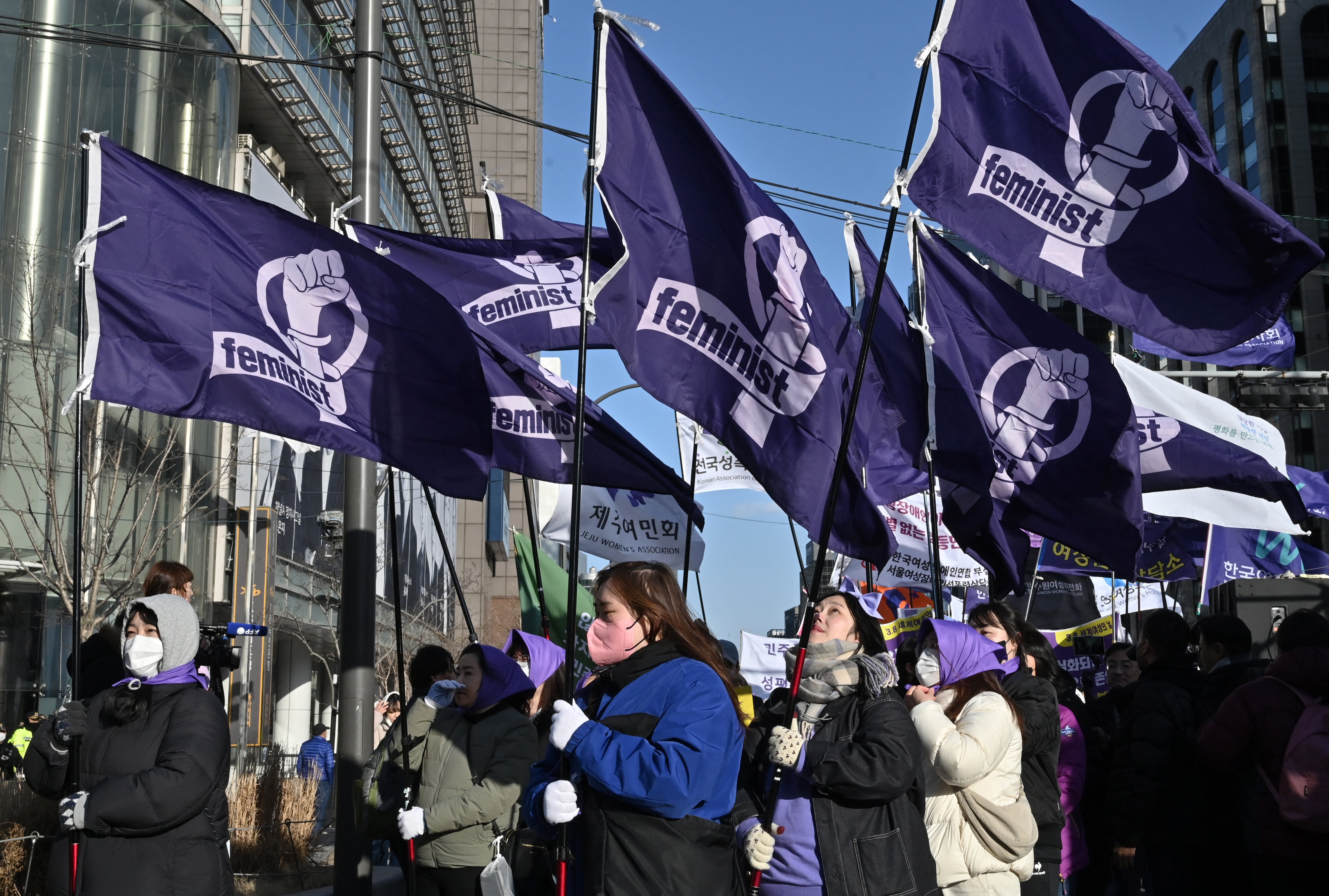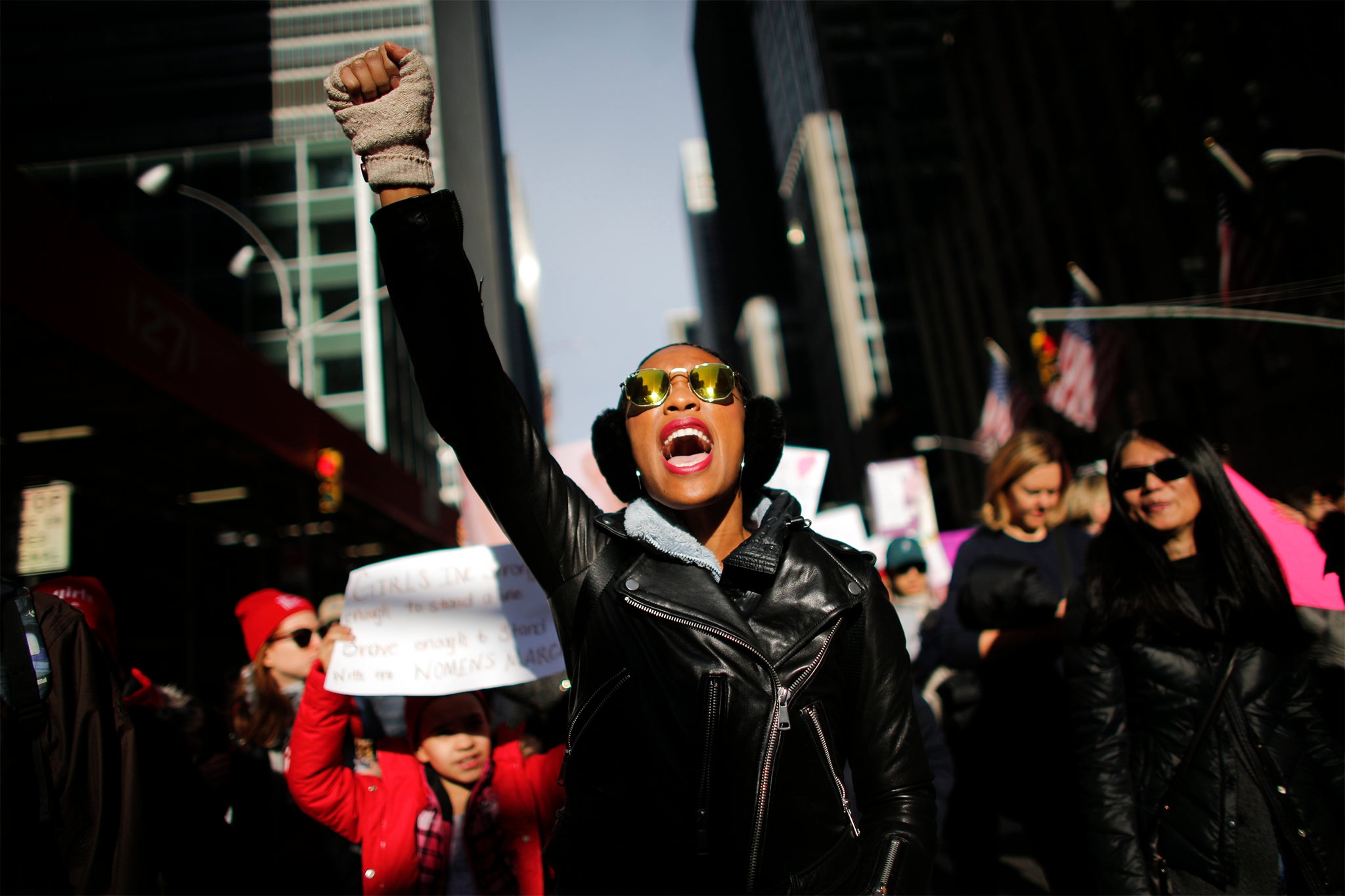Meet the women going on ‘men strike’ and cutting them out of their lives completely
The 4B movement started as a radical group in South Korea, but since Trump’s election win, more women are joining in protest at a world they believe is becoming increasingly anti-women. Zoë Beaty reports

In Missouri, hours after Donald Trump declared victory in the US election earlier this week, Ashli Pollard picked up her phone to film a video. What she’s about to say is not something she’s ever really spoken publicly about, she tells the camera – the text across her post, uploaded to TikTok, reads “Not anymore”.
On Wednesday, alongside thousands of others, 36-year-old Pollard went public about a decision she made two years ago to join a radical feminist movement that first took South Korea by storm and has now started to make inroads across the USA.
Dubbed the 4B movement, it’s a protest: women committed to its “four nos” reject any notion of having sex with men, dating them, marrying them or bearing their children.
Pollard first made her choice to become 4B quietly. Now, she’s “decided to be a bit louder”, she says forcefully. “I am so in for this movement. And I want all of you to join me.”
Her TikTok was viewed more than 2.5 million times in just over 24 hours. More than 4,000 comments were made; hundreds of thousands liked it. “I’m in a bit of a whirlwind now,” Pollard tells me – she’s never gone viral before. It makes perfect sense that she did.
Over the last few days, the 4B movement has made headlines around the world, with thousands of women making similar declarations on social media.
The movement began in South Korea back in the late 2010s as a backlash to widespread apathy and the political denial of female experience in a country with some of the highest rates of gender violence in the world. In the States, those joining it have been dismissed as “disgruntled” women “taking revenge” – women like Pollard say they’ve simply had enough.
“This isn’t like, ‘Oh, you lost the election, go cry about it,’” says Pollard. “That this election even happened [the way it did] is what we’re upset about. We’re upset that women will always be criticised, no matter what – meanwhile a rapist will still be president. The outrage isn’t that we’re sad we lost, let’s get them back. The outrage is: men hate us. We have to stop acting like they don’t.”
“It’s a war on women,” Billie Eilish declared around the same time as Pollard. Plenty agreed. Never has an election pivoted so tightly around gender. In the end, the polls said that masculinity – or the fear that it might be successfully challenged by a woman, and specifically a Black woman – won.

For liberal women, the election result was seen as an endorsement of sexual violence, following a vote that amounted to a referendum on their right to safe abortion, and they felt the loss acutely. Many say that the 4B movement – the “b” is shorthand for “bi”, meaning “no”, in Korean – is a way to gain some agency back, and to fight.
Trump’s last term saw the overturning of Roe v Wade, a landmark decision that, in the 1970s, had laid down the right to an abortion in constitutional law. As a result, more than 20 states practically outlawed abortion.
Inevitably, this led to harrowing experiences for countless women – teenage girls who had been raped, like one 13-year-old in Mississippi, who couldn’t afford to travel for healthcare and was forced to become a mother; women like 28-year-old Josseli Barnica and Nevaeh Crain, 18, who died after the ban in Texas caused mortal delays in their miscarriage care.
Alongside those promoting the 4B movement on TikTok, there are others on social media urging American women to stock up on Plan B – the morning-after pill – in fear of the grave situations they might find themselves in. Unsurprisingly, the ban has not resulted in a drop in the number of abortions performed in the US, only the number of unsafe abortions.
For Pollard, the realisation as she entered her mid-thirties that she didn’t feel comfortable having a child with a man was a key element of the decision to join the movement. In turn, it cracked open her consciousness to the fact that most of her actions, propelled by convention, were centred on the male gaze.
“The 4B movement gave me permission to take a year just to not care about men. I thought, how do I want to dress? What do I really like? Where do I want to live, if I’m not thinking about where I need to meet a man who’s similar to me. Everything, I realised, all of my decision-making – all of it, consciously or subconsciously – had involved men.”

The path to 4B wasn’t a straightforward one for Pollard, but it was one that, incrementally, made a lot of sense. Over the years she’d become disillusioned with mainstream femininity being shaped by men, and with the fear that women intrinsically carry in every part of their lives.
“What was interesting was that I knew great men; some of my friends are married to great men, I have great men in my family, and I’ve dated great men. But I’ve been observing men my entire life. And the truth is that I genuinely don’t feel safe with most of them,” says Pollard. “You hear these situations where you feel like you’re supposed to be safe – taken care of, even – and you’re just genuinely not.”
She continues: “We see it in the workplace. We see it in marriages. We see it in families. We see it on public transport. There are so few spaces that women can feel relaxed.”
Pollard, who is now planning to enter motherhood as a single woman, has already started receiving backlash for her post, but she’s not bothered by it. “Presumably, my friends and family will now see it,” she says, but that doesn’t worry her either. She was raised “very Christian” in a large, predominantly Republican family, though many of her younger relatives share her liberal views.
“People have their opinions; I don’t really care whether or not people are against it. You just won’t have access to me any more if you are. Which, really, is the entire point of the 4B movement,” she says.
“I want women to know, you do not have to care about men. You do not have to believe that you’re fat. You do not have to believe that. You don’t have to be a mom; you do not have to stay in that marriage.”

Clearly, though, it’s not so simple. The gender gap – red vs blue – might have been undeniable in the polls, but the details get quite grisly. According to the Associated Press, 53 per cent of white women voted for Donald Trump. Among 18- to 44-year-old men, 52 per cent voted Republican; the figure rises to 56 per cent among those aged 45 and over. Meanwhile, 92 per cent of Black women voted for Harris, along with 80 per cent of Black men.
What happened in this election is a multifaceted issue, which can’t be resolved by one idealistic gender-focused movement. Yet, like the unprecedented #MeToo campaign, 4B has some legs.
Some believe that the declining fertility rate – something that the worried government is taking notice of – is in part linked to the sentiment behind the 4B movement. Does Pollard think it could build in the US, and further afield?
“I don’t think the repercussions are really going to be seen in a significant way,” she says. “And even then, if there would be any tangible way we’d be able to trace it back to something like this.
“But I think that, if anything, it’s an opportunity for men to be told, that’s it – we’re done. And for women to know that it’s OK to be done. You can just be done with this. I am.”





Join our commenting forum
Join thought-provoking conversations, follow other Independent readers and see their replies
Comments